Apply to CEMUS’ spring 2025 courses! No later than October 15 before midnight at antagning.se.
Read more about how to apply at www.antagning.se. CEMUS offers the following courses during the spring semester, click on course image or read more to get to direct link to application.
Vårterminen 2025 – Spring semester 2025
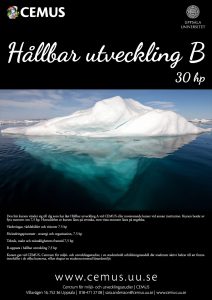 Den här kursen vänder sig till dig som har läst Hållbar utveckling A vid CEMUS eller motsvarande kurser vid annan institution. Kursen ges i huvudsak på svenska, men i två av modulerna är undervisningsspråket engelska och består av fyra obligatoriska delkurser: Värderingar, världsbilder och visioner 7.5 hp, Förändringsprocesser – strategi och organisation 7.5 hp, Teknik, makt och mänsklighetens framtid 7.5 hp, samt B-uppsats i hållbar utveckling 7.5 hp.
Den här kursen vänder sig till dig som har läst Hållbar utveckling A vid CEMUS eller motsvarande kurser vid annan institution. Kursen ges i huvudsak på svenska, men i två av modulerna är undervisningsspråket engelska och består av fyra obligatoriska delkurser: Värderingar, världsbilder och visioner 7.5 hp, Förändringsprocesser – strategi och organisation 7.5 hp, Teknik, makt och mänsklighetens framtid 7.5 hp, samt B-uppsats i hållbar utveckling 7.5 hp.Läs mer och ansök »
Actors and Strategies for Change – Towards Global Sustainabilities, 7.5 credits
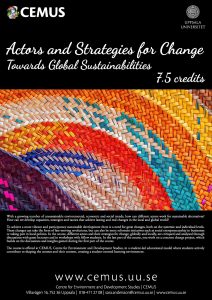 With a growing number of unsustainable environmental, economic and social trends, how can different actors work for sustainable alternatives? How can we develop capacities, strategies and tactics that achieve lasting and real changes in the local and global world?
With a growing number of unsustainable environmental, economic and social trends, how can different actors work for sustainable alternatives? How can we develop capacities, strategies and tactics that achieve lasting and real changes in the local and global world?
Read more and apply »
Technology, Power and the Future of Humanity, 7.5 credits
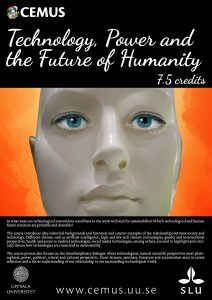 In what ways can technological innovations contribute in the work with and for sustainability? Which technological and human future scenarios are probable and desirable?
In what ways can technological innovations contribute in the work with and for sustainability? Which technological and human future scenarios are probable and desirable?
Read more and apply »
Master Programme in Sustainable Development
CEMUS is responsible for three course within the programme: Introduction to Sustainable Development, 5 credits (Autumn), Sustainable Development – Worldviews and Visions – A Seminar Series, 5 credits (Autumn), and Sustainable Development – Worldviews and Discourses – A Seminar Series, 5 credits (Spring).
Read more »
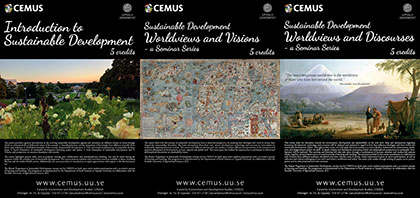
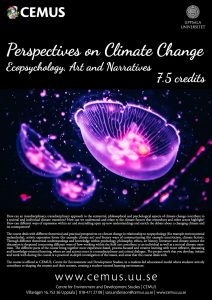 How can an interdisciplinary, transdisciplinary approach to the existential, philosophical and psychological aspects of climate change contribute to a societal and individual climate transition? How can we understand and relate to the climate futures that researchers and other actors highlight? How can different ways of expression within art and storytelling open up new understandings and enrich the debate about a changing climate and its consequences?
How can an interdisciplinary, transdisciplinary approach to the existential, philosophical and psychological aspects of climate change contribute to a societal and individual climate transition? How can we understand and relate to the climate futures that researchers and other actors highlight? How can different ways of expression within art and storytelling open up new understandings and enrich the debate about a changing climate and its consequences?Read more and apply »
Climate Change Leadership – Power, Politics and Culture, 15 credits
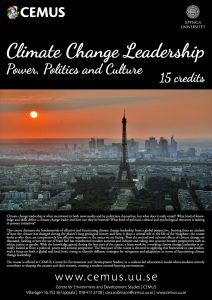 Climate change leadership is often mentioned in both news media and by politicians themselves, but what does it really entail? What kind of knowledge and skills define a climate change leader and how can they be learned? What kind of political, cultural and psychological resources are lacking in present initiatives?
Climate change leadership is often mentioned in both news media and by politicians themselves, but what does it really entail? What kind of knowledge and skills define a climate change leader and how can they be learned? What kind of political, cultural and psychological resources are lacking in present initiatives?
Read more and apply »
Sustainable Economic Futures: Nature, Equity and Community, 15 credits
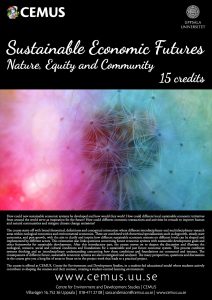 How could new sustainable economic systems be developed and how would they work? How could different local sustainable economic initiatives from around the world serve as inspiration for the future? How could different economic transactions and activities be remade to improve human and natural communities and mitigate climate change emissions?
How could new sustainable economic systems be developed and how would they work? How could different local sustainable economic initiatives from around the world serve as inspiration for the future? How could different economic transactions and activities be remade to improve human and natural communities and mitigate climate change emissions?
Read more and apply »
